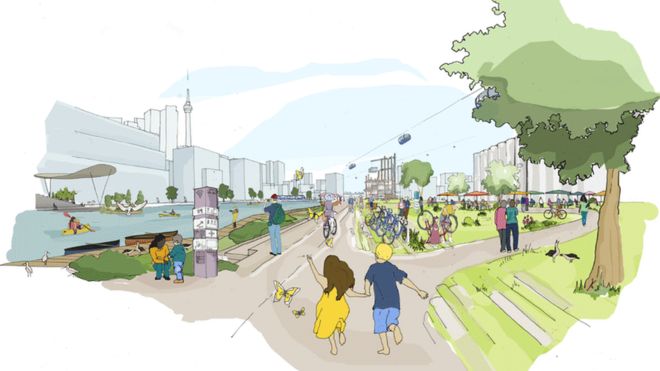It hopes the project will become a model for 21st-Century urbanism.
But the deal has been controversial, representing one of biggest ever tie-ups between a city and a large corporation.
And that, coupled with the fact that the corporation in question is one of the largest tech firms in the world, is causing some unease.
Sidewalk Labs promises to transform the disused waterfront area into a bustling mini metropolis, one built "from the internet up", although there is no timetable for when the city will actually be built.
Dan Doctoroff, the company's head and former deputy mayor of New York, told the BBC the project was "about creating healthier, safer, more convenient and more fun lives".
"We want this to be a model for what urban life can be in the 21st Century," he said.
The area will have plenty of sensors collecting data - from traffic, noise and air quality - and monitoring the performance of the electric grid and waste collection.
And that has led some in the city, including Toronto's deputy mayor Denzil Minnan-Wong, to question exactly what Sidewalk hopes to achieve.
"What data will be gathered and what is it going to be used for? These are real and prescient issues for the city of Toronto," he told the BBC.
Sidewalk Labs told the BBC that the sensors will not be used to monitor and collect information on citizens, rather it will be used to allow governments to be flexible about how neighbourhoods are used.
Mr Minnan-Wong is also concerned that the firm has not been very open with its own data.
"Sidewalk talks about open data, but from the very start the one thing that they are not making public is their agreement with Waterfront Toronto."
Waterfront Toronto is the organisation charged with revitalising the area around the city's harbour.
Initially Sidewalk's deal with the organisation will cover a 12-acre site but it is believed it wishes to expand this to the whole area - which at 325 acres will represent a huge land-grab.
"Even the idea of what land we are talking about, even something as fundamental as that is unclear," said Mr Minnan-Wong.
"Is this a real-estate play or is it a technology project? We just don't know."
He is not the only one questioning how the deal was made.
Writing on news website The Conversation, Mariana Valverde, urban law researcher at the University of Toronto, said: "The Google folks have not approached the city in the usual, highly-regulated manner, but have been negotiating, in secret, with the arms-length Waterfront Toronto.
"City staff, who have noted that even their waterfront planning experts were not consulted, have recently raised important issues regarding potential conflicts between Google's ambitions and public laws and policies.
"For example, the city has a fair procurement policy that would not allow it to let a big US company have any kind of monopoly."
More about: Google
















































